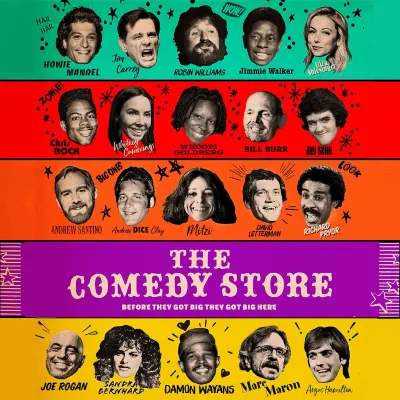The Comedy Store director Mike Binder admits he couldn't be objective in making his Showtime docuseries
-

"I realized I knew too much," says Binder in an interview with Vulture. "Especially for the first part, I was so ingrained in it; I was such a big part of it up until about 1989. Then, the second part, it was bizarre how much I didn’t know, how much a part of it I wasn’t. Then I became a real journalist, really getting in there and sussing out a story." Which part did he find most difficult, the part he knew or the part he didn't know? "Both. The parts I knew because so many of the people that I knew expected me to tell it their way," he says. "And for the new part, a lot of them were really skeptical: Who is this guy? Why is he telling this story? Why should I trust him to take care of this place that I cherish so much? Because the one thing I found is that every generation has this incredible love for the Comedy Store." As for why Binder didn't delve into the battle over the control of the Comedy Store between brothers Peter and Pauly Shore, Binder says: "Because I’m close with all three brothers. I was their babysitter. I just don’t want to air the family’s dirty laundry. They went through a long fight. They’ve worked it out. It’s done. It’s just business. It’s just money. Peter runs it. Pauly is a comedian. I don’t spend a lot of time on the Shore family at all. My focus is on stand-up comedy and Mitzi Shore’s effect on stand-up comedy."
ALSO:
- Showtime's I'm Dying Up here better portrayed the issues with The Comedy Store: "It's interesting that I'm Dying Up Here actually did a much better job of looking at how racism and sexism impacted the day-to-day operations at The Comedy Store," says Daniel Fienberg. "A decision to downplay institutional toxicity may explain why figures like Jeff Ross and Chris D'Elia are seen in passing, but not featured. Then again, there's Louis C.K. just sitting there in a new interview with (Mike) Binder that couldn't be more generic and less interested in addressing the elephant masturbating in the room. It's bizarre. Or maybe that will all come up in the fifth episode that critics haven't seen? I don't think there's anything left for Binder to get to in the timeline, but there are plenty of scandals and people still to be addressed. Whether that last hour goes dark and nuanced and smooths out the gaps Binder is previously ducking or it's just another treasure trove of clips and solid interviews remains to be seen."
- The Comedy Store is really only good for its nostalgic value: "I genuinely enjoy listening to old-timers talk about the good-old-days," says Dustin Rowles. "I wish, though, that they could be more insightful, more introspective, and most of all, more critical of those experiences, and how — though they all obviously succeeded — The Comedy Store may not have always been an ideal gatekeeper to the comedy world, especially when it helped to make famous the likes of Chris D’Elia, Bryan Callen, Andrew Dice Clay, and Louis C.K., who I understand is also inexplicably interviewed for this documentary without even a passing reference to all the female comics he sexually harassed over the years."
TOPICS: The Comedy Store (docuseries), Showtime, Mike Binder, Pauly Shore, The Comedy Store, Documentaries, Standup Comedy
More The Comedy Store on Primetimer:
